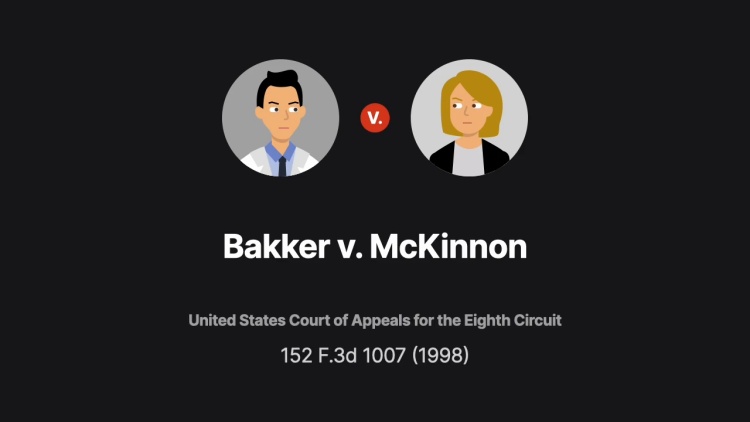Bakker v. McKinnon
United States Court of Appeals for the Eighth Circuit
152 F.3d 1007 (1998)
- Written by Angela Patrick, JD
Facts
Laura McKinnon (defendant) represented several women who claimed that Dr. Johnny Bakker (plaintiff), a dentist, had molested them during dental procedures. McKinnon engaged in a campaign to intimidate Bakker and to pressure him and his insurance company to settle the claims. As part of this campaign, McKinnon obtained a personal consumer-credit report for Bakker on two occasions and for each of Bakker’s two daughters (plaintiffs) on one occasion. These reports had been created by a credit-reporting agency for use in consumer-credit transactions. McKinnon claimed that she obtained the credit reports to see whether Bakker could satisfy an eventual judgment in the molestation cases and whether Bakker was trying to hide assets by moving them to his daughters. Bakker and his daughters sued McKinnon, arguing that McKinnon had violated the federal Fair Credit Reporting Act (FCRA) by obtaining copies of their personal consumer-credit reports. McKinnon argued that the reports were not consumer reports subject to the FCRA’s protections because she had not obtained them for a consumer purpose. Alternatively, McKinnon argued that she was allowed to use these consumer reports for the legitimate business need of litigation research. The district court determined that McKinnon had illegally obtained the reports and had done so with the intent to use them for improper intimidation purposes. The district court awarded the Bakkers $500 each in compensatory damages and $5,000 in punitive damages. McKinnon appealed the judgment to the Eighth Circuit.
Rule of Law
Issue
Holding and Reasoning (McMillian, J.)
What to do next…
Here's why 899,000 law students have relied on our case briefs:
- Written by law professors and practitioners, not other law students. 47,000 briefs, keyed to 994 casebooks. Top-notch customer support.
- The right amount of information, includes the facts, issues, rule of law, holding and reasoning, and any concurrences and dissents.
- Access in your classes, works on your mobile and tablet. Massive library of related video lessons and high quality multiple-choice questions.
- Easy to use, uniform format for every case brief. Written in plain English, not in legalese. Our briefs summarize and simplify; they don’t just repeat the court’s language.





